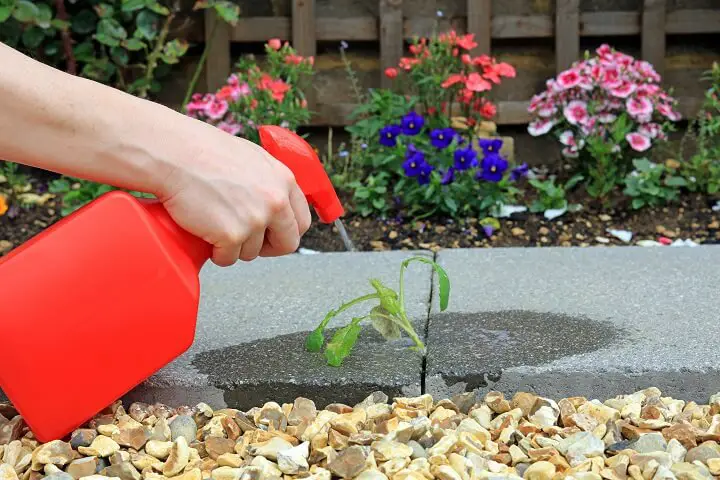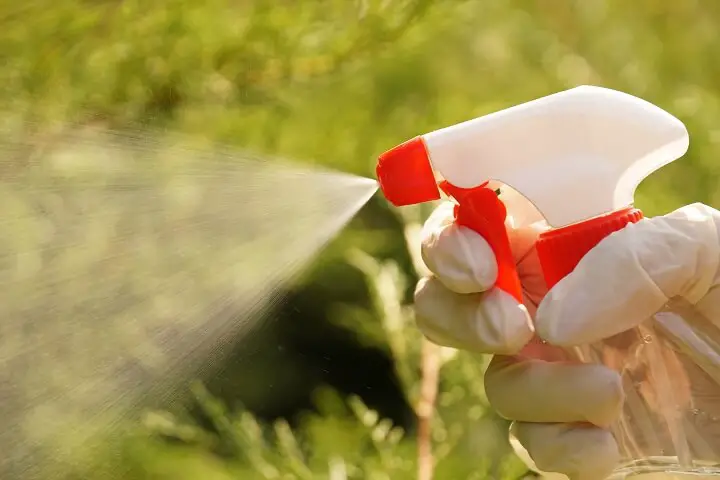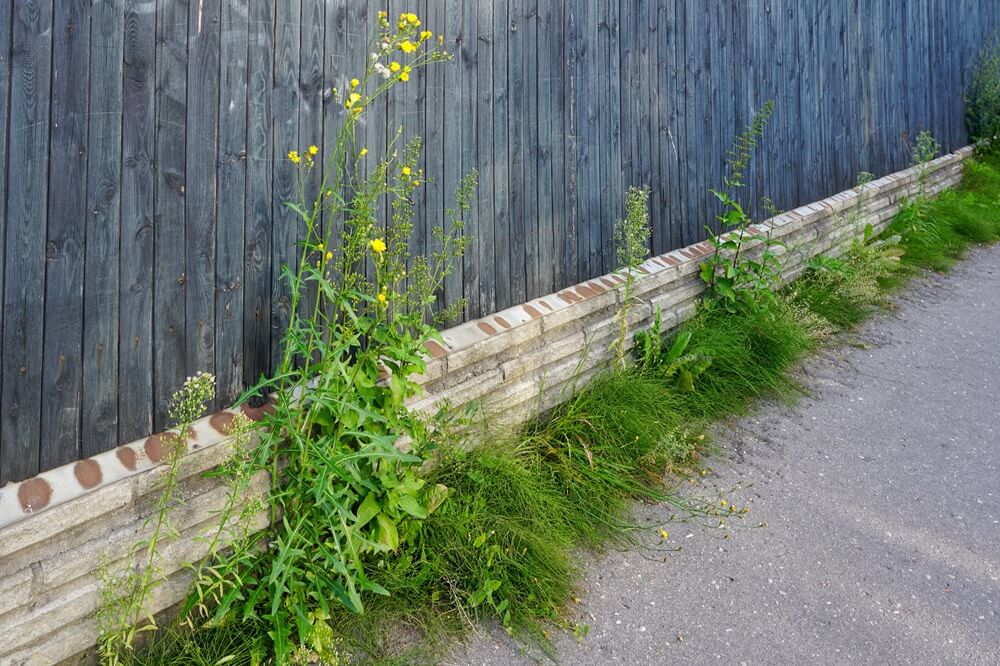[ad_1]
Estimated reading time: 9 minutes
While some weeds can be very good to have in your garden, most will steal nutrients from the soil—nutrients your plants need in order to thrive. You could try pulling them, but pulling weeds by hand is endless backbreaking work.
All that work can be in vain because many weeds have deep roots. Oftentimes, what you are pulling is just the visible surface weed, leaving the roots intact, free to continue thieving nutrients from your crops.
Chemically manufactured weed killers can take care of your weed problem, but they may do more harm than good. Potentially harmful chemicals in popular weed killers, like those in Monsanto’s Roundup Ready that have recently provoked health lawsuits, may cause damage to the human body, beneficial insects, and the soil in your growing plots.
Using natural ingredients gives the gardener complete control over what is being sprayed on the weeds, as well as what is being infused on the plants which they’ll be serving to their loved ones after the harvest.
Most of the weed killers on this list will cost less than $1 to make, and you’ll have enough to treat several large rows of weeds.
Want to save this post for later? Click Here to Pin It On Pinterest!
Top 10 Homemade Weed Killers
1. Baking Soda
Sprinkle baking soda directly onto weeds in the growing area. Apply liberally enough to fully coat the entire weed.
While the baking soda will not kill either harmful or beneficial bugs, it can kill or scorch plants. Carefully sprinkle directly onto the weeds on days when there is barely any wind and rain is not in the forecast.
2. Boiling Water
This weed killer is probably the simplest on this list, but it’s really only designed to rid raised beds or container plants of weeds due to the need to heat water to boiling and then tote it to the area to be treated before it cools.
Avoid splashing the boiling water onto plants when pouring; the boiling water will kill them as quickly as it will kill weeds.
3. Borax and Vinegar
Mix one cup of borax with one gallon of distilled white vinegar, pour it into a spray bottle, and spray your weeds.
This one works incredibly well, but I can only use it in growing plots that neither our domestic pets nor our livestock have access to. Borax is NOT boric acid, but it is toxic to animals when ingested. That’s why I often mix it with sugar to attract and kill ants and mice.

4. Essential Oil and Vinegar
Combine 1 tablespoon of either orange essential oil or clove essential oil with one cup of distilled white vinegar. Simply spray it on the weeds. But again, be sure not to get it on your other plants.
5. Lemon Juice
The acid in the lemon juice will kill even the strongest weeds. Saturate the entire plant, paying particular attention to the stem area when spraying.
For particularly strong weeds, mix one part lemon juice with one part distilled white vinegar. Add one tablespoon of cooking oil or any carrier oil you have on hand to make this weed killer even more potent.
6. Listerine and Water
Mix one cup of Listerine with one gallon of warm water and spray onto your weeds. This weed killer recipe also helps to ward off aphids.
7. Newspaper and Cardboard
This simple gardening hack is entirely free if you are recycling (or upcycling) old newspapers and cardboard. Use a weed eater or your hands to pull the weeds and then put several layers of newspaper or a sheet of cardboard over the now vacant space. Shovel some mulch or compost on top of the newspaper or cardboard to hold it in place.
Both types of paper products will eventually disintegrate, but since both of them are quality composting materials (as long as the newspaper only has black and white ink) you are enriching your soil while protecting the crops.
8. Rubbing Alcohol
To do this, mix two tablespoons of rubbing alcohol with one quart of water. Then you can pour it into a spray bottle and start spraying your weeds. This works because the alcohol removes moisture that weeds need to survive.

9. Salt and Vinegar
Mix two cups of table salt with one gallon of distilled white vinegar. Stir and/or shake vigorously to make absolutely certain the salt has completely dissolved in the vinegar.
Spray the entire weed, especially the stem, to get rid of the unwanted wild vegetation. Caution: Salt “sterilizes” the dirt, so it is unlikely anything at all will grow in that space for an incredibly long time. Any vinegar used to kill weeds should be at least five percent acetic acid to be effective.
10. Vodka
This one is easy. Just pour vodka into a spray bottle, then liberally spray your weeds with it. However, make sure you do this on a sunny day. The vodka uses heat from the sun to burn the weeds. If it gets cloudy or rainy, you’ll have to reapply the vodka.
11. Corn Gluten Meal
This is a pre-emergent herbicide that can prevent weeds from establishing. Spread corn gluten meal on your garden beds in the early spring before weeds germinate. It inhibits root formation in seedlings but won’t harm established plants.
12. Dish Soap and Salt Solution
Mix a few drops of dish soap with a gallon of water and a cup of salt. The dish soap helps the solution adhere to the weed leaves, while the salt dehydrates them. Be cautious, as this can affect the soil salinity.
13. White Vinegar and Dish Soap
A classic combination. Mix 1 gallon of 5% white vinegar with a squirt of dish soap. The acetic acid in the vinegar burns the weed leaves, and the dish soap helps the solution stick. This works best on a sunny day.
14. Cinnamon Powder
Surprisingly, cinnamon is a natural herbicide. Sprinkle it directly on weed-prone areas. Its strong scent is also a natural pest repellent, but be careful not to overapply, as it can harm your desired plants too.
15. Mulch Overlays
Though not a ‘killer’ in the traditional sense, a thick layer of organic mulch can effectively suppress weed growth. It blocks sunlight, preventing weed germination, and also enriches the soil as it decomposes.

What Makes Weed Killer Ingredients So Powerful?
Citrus Essential Oils
Using citrus essential oils (orange, grapefruit, lime, and lemon) will help “burn” or “scald” the weeds due to the natural acid they contain and their highly concentrated nature.
Oil
Oil cannot be used alone as a weed killer, as both salt and vinegar can, but it can be a valuable component to add to any of the weed killers above.
The oil breaks down the waxy and protective coverings on weeds and allows the vinegar and salt concoctions to work far more effectively. Once the protective coatings are stripped away, vinegar or salt (or both) cannot fully saturate the weed stems and help kill the unwanted vegetation.
When oil is added to a weed killer recipe, it thickens it. While this means that using an agricultural sprayer to deliver the solution to the weeds won’t be possible, it also means the ingredients will have far less runoff.
Delivering the weed killer recipe via a sprinkling can instead a sprayer should also help prevent any unwanted splattering onto your growing groceries just a few inches away. The longer the solution remains on the weeds, the better the chances are that it will soon be a dead weed.
Salt
Common table salt has a sodium chloride base. This base ingredient is also a desiccant that will suck moisture from the stems and leaves of weeds—or any plant it touches. When vinegar and salt are combined, you usually get astonishingly rapid results.
Vinegar
There is good reason vinegar is at the base of many homemade weed killers… it works.
Vinegar alone can work just fine on some weeds, but the addition of table salt, Epsom salts, or dish soap is often needed to kill particularly difficult weeds and Bermuda grass. You can use any dish soap, but I have had the greatest success when using Blue Dawn. I also use Blue Dawn dish soap as a base ingredient for many of my garden insect killer recipes.
The reason vinegar works so well to kill weeds (and likely insect pests, as well) is its acetic acid content. Most distilled white vinegar sold at grocery stores contains three to five percent acetic acid.
Acetic acid is a desiccant, meaning it removes moisture from what it touches. This acid is also the reason it is used to preserve food. When distilled white vinegar is prayed upon weeds, it draws all of the above-ground moisture from the weed.
While the vinegar can also wreak havoc on roots, such a prime result should not be expected. If the weeds being sprayed have a wax coating or similar protective covering, a vinegar-based spray will not have as potent of an effect.
Whenever possible, use vinegar that has a 10 to 20 percent acetic acid content. While a concentration this high is usually not necessary to kill young or weak weeds, it can vitally boost your eradication efforts when treating tough and fast-growing weeds.
Apple cider vinegar can be used in weed recipes also, but it can be slightly less effective against strong weeds.
One More Tip
Always wait to make homemade weed killers when you are ready to use them. The potency of the mixtures or even single ingredient weed killers will diminish once they are exposed to air and sunlight.
Like this post? Don’t Forget to Pin It On Pinterest!
[ad_2]
Source link
Get more stuff like this
in your inbox
Don't Be Left Unprepared
Thank you for subscribing.
Something went wrong.



![Kobalt 80v Self Propelled Mower Review [Kobalt vs Greenworks, DeWalt, and EGO Lawn Mowers] Kobalt 80v Self Propelled Mower Review [Kobalt vs Greenworks, DeWalt, and EGO Lawn Mowers]](https://i0.wp.com/theworldofsurvival.com/wp-content/uploads/2021/03/Kobalt-80v-Self-Propelled-Mower-Review-Kobalt-vs-Greenworks-DeWalt.jpg?resize=370%2C297&ssl=1 370w, https://i0.wp.com/theworldofsurvival.com/wp-content/uploads/2021/03/Kobalt-80v-Self-Propelled-Mower-Review-Kobalt-vs-Greenworks-DeWalt.jpg?zoom=2&resize=370%2C297&ssl=1 740w, https://i0.wp.com/theworldofsurvival.com/wp-content/uploads/2021/03/Kobalt-80v-Self-Propelled-Mower-Review-Kobalt-vs-Greenworks-DeWalt.jpg?zoom=3&resize=370%2C297&ssl=1 1110w)


